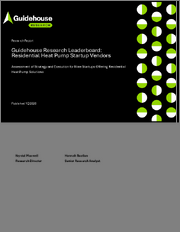
|
시장보고서
상품코드
1620280
주거용 히트 펌프(HP) 산업(2024-2035년)Residential Heat Pump Industry, Global, 2024-2035 |
||||||
주택을 탈탄소화하는 요구가 변혁적 성장을 가속
세계 주거용 히트 펌프(HP) 시장은 2024년 760만대에서 2035년에는 1,700만대에 이를 것으로 예측됩니다. 시장 예측에는 시장의 정의가 중요하며 Sullivan은 공조용 HP 판매를 제외하고 있습니다. 시장 수익은 2024년부터 2035년까지 CAGR이 8.5%로 전망되며, 2035년에는 804억 3,000만 달러에 이를 것으로 예측됩니다. 2024년 기준으로는 유럽과 미국이 최대 시장으로 세계 판매량의 74.6%, 세계 수익의 74.0%를 차지했으며, 중국과 일본이 뒤를 잇고 있습니다. HP는 재생 가능한 전력으로 구동하기 때문에 효율이 높고 열의 탈탄소화를 가속할 수 있는 등 몇 가지 이점이 있습니다. 그러나 과제로는 시장이나 장소에 의존하는 적합성이나 가정의 건축 연수나 단열성 등 평가가 필요한 요소가 있습니다. 특히 기존 물건에 대한 도입 비용은 크고 HP는 가스보일러보다 자본 비용이 높습니다. 또한 HP가 지역 전력망에 부담을 주지 않도록 하려면 보다 광범위한 투자가 필요합니다. 일부 시장에서는 숙련된 설치 업체나 컨설턴트가 부족하고 일반인들은 보일러 기술에 익숙하기 때문에 주저하고 있습니다.
목차
전략적 과제
- 왜 성장이 어려워지고 있는가?
- The Strategic Imperative 8(TM)
- 주거용 히트 펌프(HP) 업계에서 상위 3가지 전략적 중요 과제의 영향
- 성장 기회가 Growth Pipeline Engine(TM)을 가속
성장 기회 분석
- 주요 인사이트
성장 환경 : 생태계
- 분석 범위
- 시장 개요 및 정의
- 세분화
- 유통 채널
성장 환경 : 행동하는 기업(C2A)
- 경쟁 환경
- 주요 경쟁업체
성장 기회 분석 : 성장 발전기
- 성장 지표
- 시장 개요와 정의
- 성장 촉진요인
- 성장 억제요인
- 히트 아즈 아 서비스
- 주택 에너지 사용량의 변화
- 유럽의 히트 펌프 경쟁
- 히트 펌프의 설치 베이스
- 히트 펌프는 가스 보일러보다 싸다-사실인가 허구인가?(영국의 사례)
- 히트 펌프에 유리한 EU 규제의 전망
- 유럽 전역에서의 화석연료 금지
- 신축 빌딩의 HP 국가별 지원 메커니즘
- 리노베이션 빌딩의 HP 국가별 지원 메커니즘
- 예측에 관한 인사이트
- 주거용 HP 수익 및 출하 대수의 예측
- 주거용 HP 기술별 출하 대수 예측
- 주거용 HP 기술별 수익 예측
- ASHP(ATA) 용도별 출하 대수와 수익 예측
- ASHP(ATW) 용도별 출하 대수와 수익 예측
- 주거용 HP 지역별 출하 대수 예측
- 주거용 HP 지역별 수익과 예측
- 지역별 수익과 출하 대수 예측 분석
- 경쟁 환경-계층별 분석
- 경쟁 환경 분석
- 주거용 HP 국가별 출하 대수 예측
- 국가별 ASHP 출하 대수 예측
- 국가별 ASHP(공기-공기) 용도별 출하 대수 예측
- ASHP(공기-물) 용도별 출하 대수 예측 : 국가별
- 국가별 GSHP 유닛 출하 대수 예측
- 주거용 HP의 국가별 수익 예측
- 국가별 ASHP의 수익 예측
- ASHP(공기-공기) 용도별 국가별 매출수익 예측
- ASHP(공기-물) 용도별 국가별 수익 예측
- GSHP 국가별 수익 예측
- 주거용 HP 시장-프랑스
- 설치 기반 예측-프랑스
- 주거용 HP 시장-영국
- 설치 기반 예측-영국
- 주거용 HP 시장-독일
- 설치 기반 예측-독일
- 주거용 HP 시장-이탈리아
- 설치 기반 예측-이탈리아
- 주거용 HP 시장-스웨덴
- 설치 기반 예측-스웨덴
- 주택 HP 시장-덴마크
- 설치 기반 예측-덴마크
- 주거용 HP 시장-핀란드
- 설치 기반 예측-핀란드
- 주거용 HP 시장-스페인
- 설치 기반 예측-스페인
- 주거용 HP 시장-네덜란드
- 설치 기반 예측-네덜란드
- 주거용 HP 시장-노르웨이
- 설치 기반 예측-노르웨이
- 주거용 HP 시장-폴란드
- 설치 기반 예측-폴란드
- 주거용 HP 시장-미국
- 설치 기반 예측-미국
성장 기회
- 성장 기회 1 : 히트 아즈 아 서비스
- 성장 기회 2 : 업계의 융합
- 성장 기회 3 : 스마트 히트 펌프
부록 및 다음 단계
- 성장 기회의 장점과 영향
- 다음 단계
- 별지 리스트
- 면책사항
The Need to Decarbonize Residential Buildings is Driving Transformational Growth
The global residential heat pump (HP) market is forecast to reach 17.0 million units by 2035, up from 7.6 million in 2024. Market definitions are important to the market forecast, and Frost & Sullivan excludes the sale of HPs for air conditioning. Market revenues are forecast to reach $80.43 billion by 2035, at a CAGR of 8.5% from 2024 to 2035. As of 2024, Europe and the United States are the largest markets, holding 74.6% of global unit sales and 74.0% of global revenues, followed by China and Japan. HPs offer several advantages, including higher efficiency and the acceleration of heat decarbonization, as renewable electricity powers them. However, challenges include market- and site-dependent suitability and factors such as the age of households and insulation that require evaluation. Installation costs, especially for existing properties, are significant, and HPs have higher capital costs than gas boilers. Additionally, wider investment is necessary to ensure that HPs do not strain local electricity grids. Skilled installers and consultants are lacking in some markets, and the public is hesitant because of their familiarity with boiler technology.
Table of Contents
Strategic Imperatives
- Why is it Increasingly Difficult to Grow?
- The Strategic Imperative 8™
- The Impact of the Top 3 Strategic Imperatives on the Residential Heat Pump (HP) Industry
- Growth Opportunities Fuel the Growth Pipeline Engine™
Growth Opportunity Analysis
- Key Insights
Growth Environment: Ecosystem
- Scope of Analysis
- Market Overview and Definitions
- Segmentation
- Distribution Channels
Growth Environment: Companies to Action (C2A)
- Competitive Environment
- Key Competitors
Growth Opportunity Analysis: Growth Generator
- Growth Metrics
- Market Overview and Definitions
- Growth Drivers
- Growth Restraints
- Heat-as-a-Service
- Residential Energy Uses Variances
- The European Race for Heat Pumps
- Heat Pumps Installed Base
- HPs are Cheaper than Gas Boilers-Fact or Fiction? (UK Case Example)
- EU Regulatory Outlook Favoring HPs
- Fossil Fuel Bans Across Europe
- Support Mechanisms by Country for HPs in New Buildings
- Support Mechanisms by Country for HPs in Renovated Buildings
- Forecast Considerations
- Residential HP Revenue and Unit Shipment Forecast
- Residential HP Unit Shipment Forecast by Technology
- Residential HP Revenue Forecast by Technology
- Unit Shipment and Revenue Forecast by ASHP (ATA) Application
- Unit Shipment and Revenue Forecast by ASHP (ATW) Application
- Residential HP Unit Forecast by Region
- Residential HP Revenue Forecast by Region
- Revenue and Unit Shipment Forecast Analysis by Region
- Competitive Environment-Tier Analysis
- Competitive Environment-Analysis
- Residential HP Unit Shipment Forecast by Country
- ASHP Unit Shipment Forecast by Country
- Unit Shipment Forecast by ASHP (Air-Air) Application by Country
- Unit Shipment Forecast by ASHP (Air-Water) Application by Country
- GSHP Unit Shipment Forecast by Country
- Residential HP Revenue Forecast by Country
- ASHP Revenue Forecast by Country
- Revenue Forecast by ASHP (Air-Air) Application by Country
- Revenue Forecast by ASHP (Air-Water) Application by Country
- GSHP Revenue Forecast by Country
- Residential HP Market-France
- Installed Base Forecast-France
- Residential HP Market-United Kingdom
- Installed Base Forecast-United Kingdom
- Residential HP Market-Germany
- Installed Base Forecast-Germany
- Residential HP Market-Italy
- Installed Base Forecast-Italy
- Residential HP Market-Sweden
- Installed Base Forecast-Sweden
- Residential HP Market-Denmark
- Installed Base Forecast-Denmark
- Residential HP Market-Finland
- Installed Base Forecast-Finland
- Residential HP Market-Spain
- Installed Base Forecast-Spain
- Residential HP Market-The Netherlands
- Installed Base Forecast-The Netherlands
- Residential HP Market-Norway
- Installed Base Forecast-Norway
- Residential HP Market-Poland
- Installed Base Forecast-Poland
- Residential HP Market-United States
- Installed Base Forecast-United States
Growth Opportunity Universe
- Growth Opportunity 1: Heat-as-a-Service
- Growth Opportunity 2: Industry Convergence
- Growth Opportunity 3: Smart Heat Pumps
Appendix & Next Steps
- Benefits and Impacts of Growth Opportunities
- Next Steps
- List of Exhibits
- Legal Disclaimer














